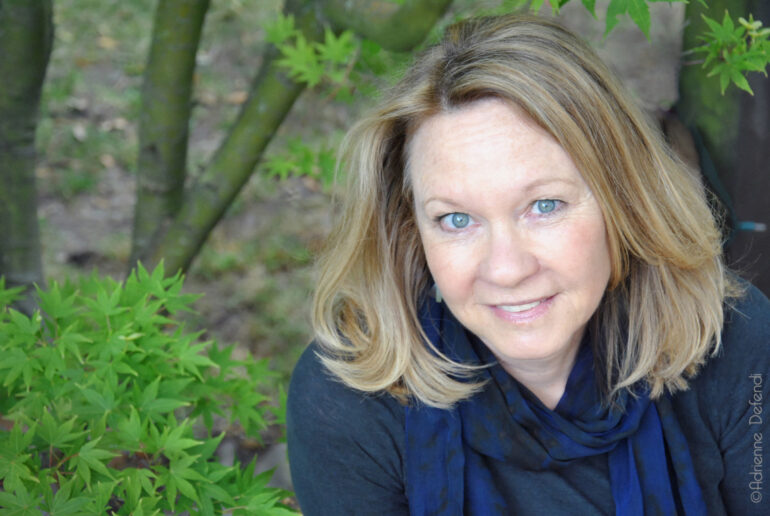The New York Times best-selling author Meg Waite Clayton’s seventh novel, The Last Train to London, was an international bestseller, earning recognition from USA Today, Publisher’s Weekly and the National Jewish Book Awards, and her screenplay for the novel was chosen for the Meryl Streep– and Nicole Kidman-sponsored The Writers Lab. So it’s no wonder that her latest novel, The Postmistress of Paris, was hotly anticipated.
In her new book, Clayton revisits the horrors of World War II, but this time in France, in the early days of the Nazi occupation of Paris. The novel follows a young American heiress who helps artists hunted by the Nazis escape from war-torn Europe, inspired by the real-life Chicago heiress Mary Jayne Gold. This is a haunting story of an indomitable woman whose strength, bravery and love is a beacon of hope in a time of terror.
We spoke to her about her new book.
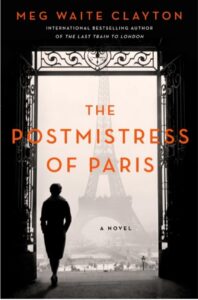
Most of your books are works of historical fiction. What draws you to write stories that draw from history?
I suppose I turn to historical fiction because it is so often what, as a reader, rips out my own guts. Erich Remarque’s All Quiet on the Western Front. Joseph Heller’s Catch 22. Anton Myrer’s The Last Convertible. Sometimes fiction really is the best way to allow us not just to learn the facts of a time, but to immerse ourselves in it, to feel how it was. And plumbing historical periods, the worst of times, allows us to explore the worst of what people will do — but also, and more importantly, the best: the incredible acts of courage and selflessness.
The immersion in the story that I get as a reader and as a writer — imagining myself as these characters — has a bigger impact on me than all the facts delivered without the emotion of the story will. We can of course tell a story in a nonfiction context; writers like Erik Larson and Julia Flynn Siler do that so well. But I like the flexibility that writing fiction offers to bend stories inspired by real events in ways that will wedge themselves more deeply into my own heart and, I hope, in readers’ hearts as well.
Many of them, including your latest, relate to WWII. What particularly fascinates you about that period of time?
The great storyteller in my family was my Uncle Jim, who was a bombardier in the war — one of the most dangerous and most destructive roles anyone was asked to undertake. He told stories that made us laugh until we cried, or cry until we laughed, but never, in all the stories he told, did he ever even mention the war. He came back from the war broken, by all accounts, and although he went on with life in really admirable ways, neither my dad, who lived with Jim when they attended law school after Jim came back, nor his wife, my Aunt Jackie, ever heard him speak of the war.
Always, it’s what people won’t talk about that I most want to understand, I suppose in part to try to understand why I keep my own secrets.
But also — and this I have learned more from my own research than from the things I learned in college — the WWII years were a big pivot point for women. We began doing things we didn’t do before or doing them in greater numbers, in part because men weren’t there to do them. And I love that: exploring women forging the path. There is nothing I love more than finding a forgotten heroine and championing her. The women I write about inspire me, and I hope will inspire readers too.
How did you come across the person who inspired your latest novel, Mary Jayne Gold, and why do you think she intrigued you?
Mary Jayne Gold came to me through a bit of a Rube Goldbergian research path: I set off to explore a story about Truss Wijsmuller, the heroine of The Last Train to London, being arrested by the Gestapo a second time (this time not in Vienna but in Southern France), which sent me rolling toward the Côte d’Azur, where I bounced and rolled and fell through various other stories — all of which are possibilities for novels yet to be written! — until I came up at Villa Air Bel. And who doesn’t love an old French villa in Provence where artists and writers and thinkers hung out together, drinking wine and playing games? Oh, yes, and evading arrest by Vichy and/or the Nazis, or helping others do so.
One of the earliest photos I saw of the villa was Danny Benedité literally hanging art from the plane trees on the belvedere there, and that fascinated me. And a little poking led me to the discovery that this whole world would not have existed but for Mary Jayne Gold.
She intrigued me because she is who she is: a Chicago heiress living in Paris when Hitler invaded France. She might have gone home, like most Americans did. And she at first meant to. But when it came time to leave, she instead chose to stay and try to do some good for others, because she hated what she saw going on. There are so many reasons to love Mary Jayne Gold: she flew airplanes when few people did, and even fewer women. She lived in Paris, my favorite city in the world. She’s quite irreverent, and complicated. But most importantly, she had a huge heart, and a lot of guts.
The book deals with the world of artists and intellectuals who were affected by WWII — was there a reason you chose to focus on this part of society in the story?
This aspect of the story — the artists and writers and thinkers — came with Mary Jayne Gold, because the effort she became involved with was Varian Fry’s CAS. Fry literally came to France with a list of artists and intellectuals for whom he could obtain American visas.
I’m not sure, though, whether this was the reason I plunged into her story, or just happened to be part of the story I plunged into. I’m drawn to writers and artists, and especially photographers. I find photographs so evocative. Like the fiction I try to write, they are always capturing something real, often asking us to view it from an unfamiliar angle and see it fresh, see what we so often overlook.
You have a lot of information about how to write and writing tips on your website, is this something you get asked about a lot? Did becoming a novelist later in life inspire you to help others who want to write?
I’ve received so much encouragement and support from others, especially from other women — which helped me keep writing in the ten years it took me to get my first novel published, and keeps me going still. So my efforts to support other writers are one part paying it forward, a small thank you to people like Alice McDermott and Karen Joy Fowler and Robin Swicord, who have supported me.
But also, I enjoy it immensely. I think most of us who haven’t written, or haven’t published, imagine a real writer knows exactly what to write and is born knowing how to do it, that she dashes off a first draft and sends it out and voila, there she is on the bestseller lists and/or collecting awards. I’m not sure anyone images the mounds of rejection almost any writer faces.
But there is comfort, as we struggle, in knowing that we aren’t alone, that others who have achieved some writing success struggled too. If we’re not completing stories, well, it’s hard, it takes time, it takes draft after draft after draft. If we’re not getting published, it isn’t a sign that we aren’t meant to be writers. It’s just a sign that we’re not getting published … yet. Maybe our work needs more work. Maybe it just hasn’t found its way to the right audience. Failure is just a step on the way to success in writing, except when we give up. When we give up writing, we by definition fail. So the trick is to keep believing in yourself long after your own mother would give up on you.
I still sometimes cannot believe I actually get to do this — to write and be published and read. But the writing, especially. In writing, I look at the world around me more closely, and with more forgiveness.
More Great New Reads:
David Sedaris/ A Carnival of Snackery
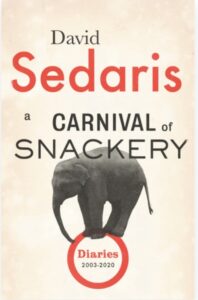
There are no rules when it comes to keeping a diary, least of all one kept by writer/humorist, David Sedaris. In his latest book, A Carnival of Snackery, he doesn’t disappoint, delivering his usual and beloved brand of laughs throughout. These diaries remind you that you once really hated George W. Bush, and that not too long ago, Donald Trump was just a harmless laughingstock, at least on French TV. Time marches on, and Sedaris, at his desk or on planes, in hotel dining rooms and odd Japanese inns, records it. The entries here reflect an ever-changing background—new administrations, new restrictions on speech and conduct. What you can say at the start of the book, you can’t by the end. At its best, A Carnival of Snackery is a sort of sampler: the bitter and the sweet. Some entries are just what you wanted. Others you might want to spit discreetly into a napkin.
With sardonic wit and incisive social critiques, David Sedaris has become one of America’s pre-eminent humor writers. The great skill with which he slices through cultural euphemisms and political correctness proves that Sedaris is a master of satire and one of the most observant writers addressing the human condition today. David Sedaris is the author of Barrel Fever and Holidays on Ice, as well as collections of personal essays, Naked, Me Talk Pretty One Day, Dress Your Family in Corduroy and Denim, When You Are Engulfed in Flames, and his most recent book, Let’s Explore Diabetes with Owls, each of which became an immediate bestseller.
Mondiant Dogan/Those We Throw Away are Diamonds
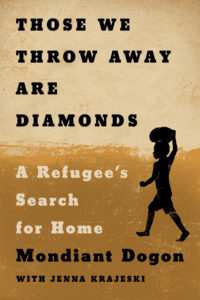
This is a stunning and heartbreaking lens on the global refugee crisis, from a man who faced the very worst of humanity and survived to advocate for displaced people around the world. One day when Mondiant Dogon, a Bagogwe Tutsi born in the Democratic Republic of Congo, was only three years old, his father’s lifelong friend, a Hutu man, came to their home with a machete in his hand and warned the family they were to be killed within hours. Dogon’s family fled into the forest, initiating a long and dangerous journey into Rwanda. They made their way to the first of several UN tent cities in which they would spend decades. But their search for a safe haven had just begun.
Rarely do refugees get to tell their own stories. We see them only for a moment, if at all, in flight. But through his writing, Dogon took control of his own narrative and spoke up for forever refugees everywhere. Mondiant Nshimiyimana Dogon is an author, human rights activist, and refugee ambassador. Since 1996 he has lived in refugee camps. Dogon holds a BA from the University of Rwanda and an MA in international education from New York University.
Lidia Matticchio Bastianich/ A Pot, a Pan, and a Bowl
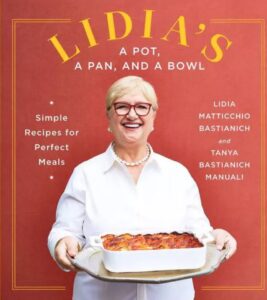
From the beloved TV chef and best-selling author comes a collection of her favorite recipes for flavorful, no-fuss Italian food that use just one pot or pan (or two.). Don’t miss this companion cookbook to the upcoming public-television series Lidia’s Kitchen: Home Cooking. Lidia Bastianich—doyenne of Italian cooking (Chicago Times)—makes Italian cooking easy for everyone with this new, beautifully designed, easy-to-use cookbook. Here are more than 100 homey, simple-to-prepare recipes that require fewer steps and fewer ingredients (not to mention fewer dirty pots and pans), without sacrificing any of their flavor.
For more on Better:
- How to Express Yourself in Publishing: Writing a Book, From Draft to Publication, With Authors Betsy B. Murphy and Mark Shaw
- A Novel About the Turbulent 1960s and ’70s, From Professor, Social Justice Advocate and Writing Coach Cathy Rath
- Fall 2021 TV and Film Preview: 28 Best TV Shows and Movies to Watch This Season

Jessica Gliddon is the Senior Digital Editor for Make It Better Media Group. An international writer and editor, she has worked on publications in the UK, Dubai and Cape Town. She is a graduate of UC Santa Cruz, and is the former editor of Abu Dhabi’s airline magazine, Etihad Inflight. When she’s not checking out the latest exhibit at SFMOMA or searching out the best places to eat and drink near her home in San Francisco, she volunteers at the Marine Mammal Center in Sausalito.
